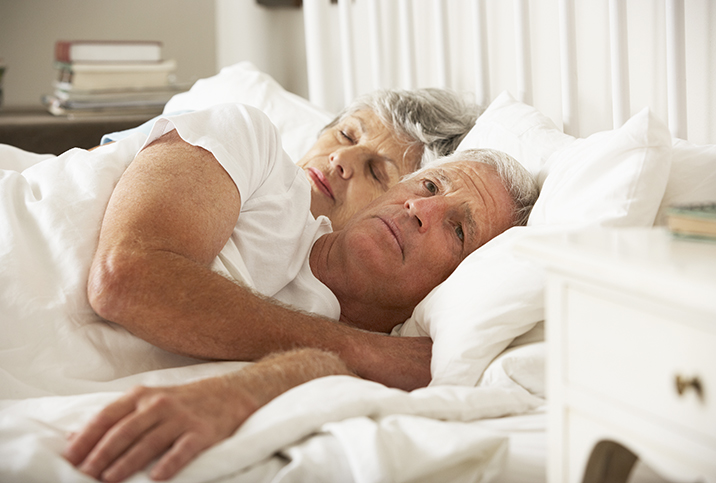How Chemotherapy Can Cause Low-T

While one of the better known side effects of chemotherapy is fatigue—which makes sense when medical experts are pumping your body full of powerful chemicals to kill an invading army of cancerous cells—the source of this effect in male patients is actually a bit surprising.
Chemo's powerful treatment isn't choosy about which areas of the body it attacks, instead targeting a wide swath of cells, only some of which are cancerous, and leaving important hormone-producing glands to suffer in the process. Among the variety of side effects that chemo can cause, those affecting sexual and hormonal health can have the most wide-ranging impact.
How significant that impact is depends on the dosage, type of chemo treatment used and whether the cancer has reached metastasis, the most serious growth phase where the tumor has spread from its origin to other parts of the body. While there isn't a fully evident scale or range to go by, it's relatively safe to say that the higher and more broadly applied the chemo dosage, the higher the risk of significant side effects such as low testosterone, which can sap your energy. Low-T can also lead to muscle loss and erectile dysfunction (ED), and effectively kill your sex drive.
Immunotherapy agents used in simple chemo aren't extremely toxic to certain testosterone-producing cells, according to some studies, such as this 1996 research in the European Journal of Endocrinology. But aggressive chemo can cause issues, said Paul Simon, PhD, a Montreal-based fertility specialist and director of operations at fertility service Legacy.
How chemotherapy can disrupt hormonal health
Several hormones, all of which originate from the hypothalamus, are involved in the production of testosterone, Simon explained. That region of the brain controls, among other functions, the activity of the pituitary gland, which dictates how hormones are released into the body.
One of these hormones, the luteinizing hormone (LH), is especially important in men as it stimulates testosterone production in the testes. Since more significant doses of chemotherapy target a general range of cells rather than the specific cancerous ones, the treatment can impact the cells that produce LH and testosterone, causing hypogonadism, or below-normal production of sexual hormones in the testes or ovaries.
Men with lower LH levels often experience infertility because the lack of LH affects the ability to create sperm, according to a 2014 Translational Andrology and Urology study. Onset of these issues is more common in older patients, according to Simon. The age threshold isn't clearly defined, but a 2020 International Journal of Molecular Science study indicated that "adulthood" exposure—generally age 18 and up—to certain chemotherapy agents put patients at a "high" risk for infertility.
Since the production of sperm is stimulated by testosterone, the broad cell targeting of chemotherapy can impact the ability to create sperm post-treatment, too.
"You could be fortunate and have a normal return of function, but there's also the possibility that you'll be of below-average fertility," Simon said. "Not all therapies are likely to damage cells, but in a fair amount of cases, you'll see some degree of impact."
Testicular cancers are often treated with more intense forms of chemotherapy at shorter cycle intervals (i.e., a few weeks in between doses compared to a few months), so there's also a higher risk for testosterone production disruption.
"Chemo works by killing cells in the body that are dividing quickly," Simon said. "Since sperm cells divide quickly, they are an easy target for damage by chemo."
Even with these bodily disruptions, however, chemotherapy on its own shouldn't cause ED.
Special considerations for testicular cancers
Treating testicular cancers with chemotherapy is especially tricky considering the hormonal impact, Simon said.
"In these cases, testosterone production will be doing all sorts of wild things," he said, since the very cells producing testosterone—the Leydig cells (or their neighbor, the germinal cells)—are cancerous. "The actual effect of chemo becomes unclear because the cancer is affecting the source of testosterone production."
Testicular cancer treatment often includes the removal of one or both testes based on the severity of the case, and that in itself can have additional impacts on long-term testosterone production. If one is removed, the remaining teste can eventually compensate for his missing ally and return the body to normal production levels, but it can take a long time. If both are removed, only a minimal amount of testosterone will be produced by the adrenal glands.
Lasting impacts & treatment options
Beyond the mood and emotional side effects of low-T, the imbalance of the hormone often leads to patients carrying more fat and having an inability to maintain lean body mass. This can lead to an increased risk of heart disease, type 2 diabetes (as noted in a 2011 Current Hypertension Reports study) and other potential illnesses.
The most common treatment route for low-T is testosterone replacement therapy, which has unclear effects on people who've undergone chemo or other cancer treatments. It's worth noting that radiation therapy may have similar impacts on testosterone production, especially in treatments involving reproductive organs, according to Simon.
Understanding the impact chemo can have on sexual health prior to beginning treatment can help you decide if it's right for you and find ways to mitigate some of the side effects along the way.

















